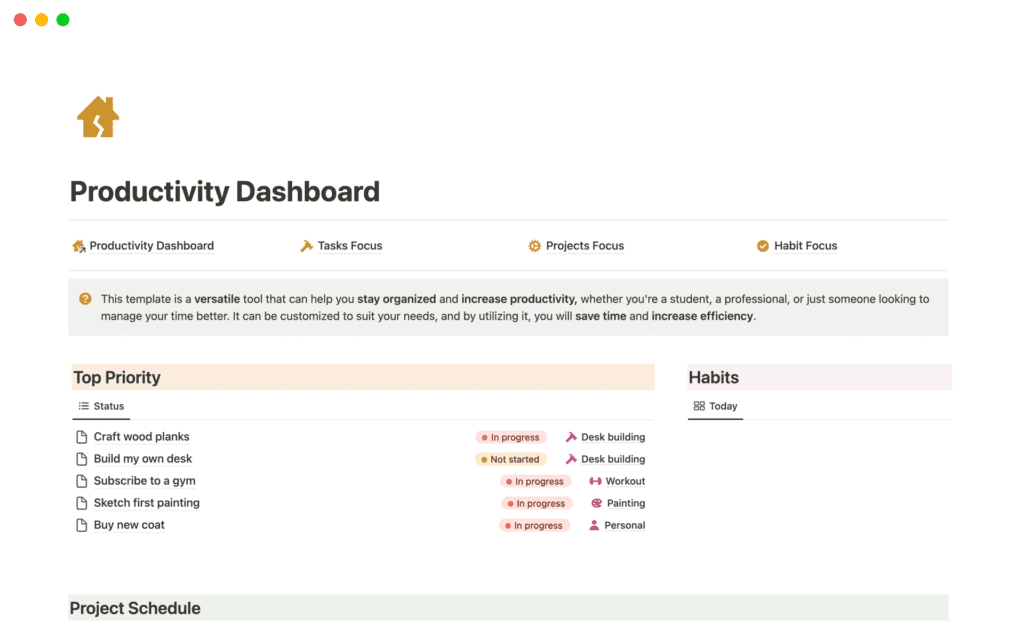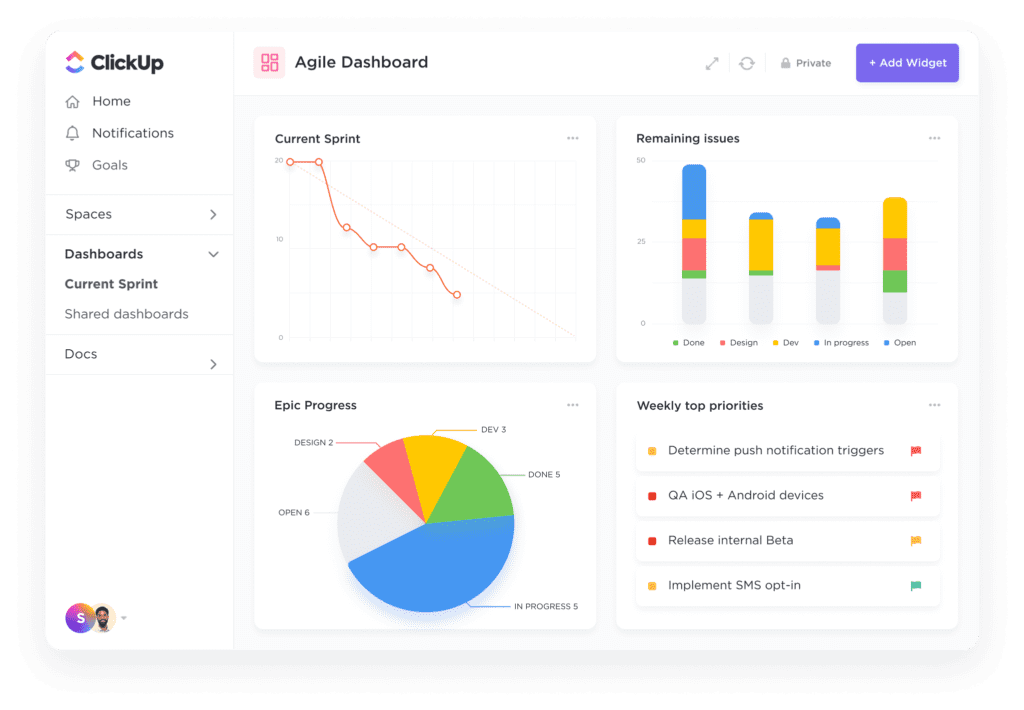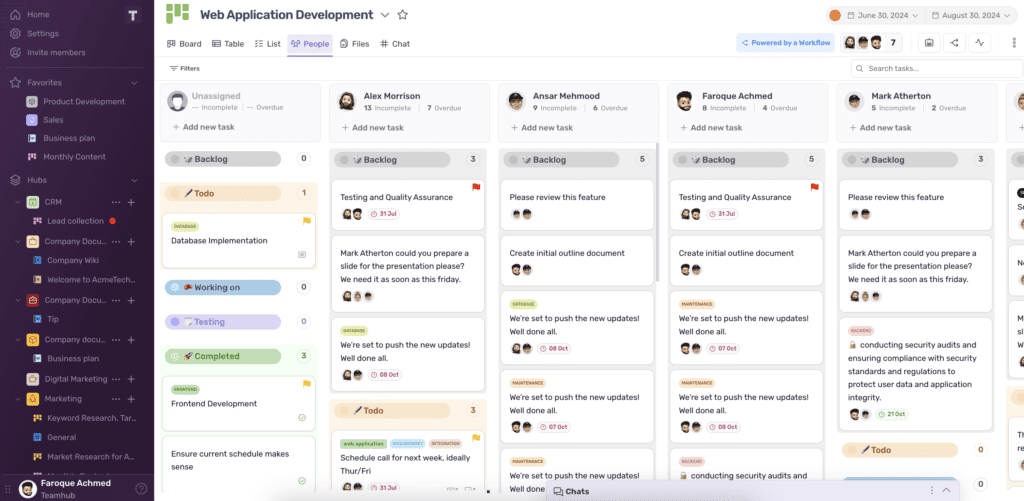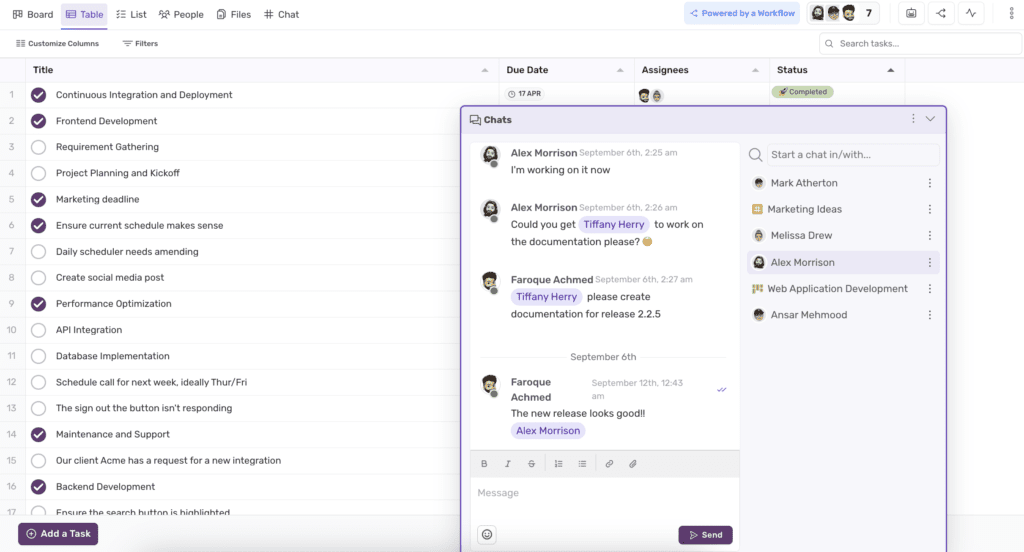Notion vs. ClickUp vs. Teamhub: A Comprehensive Comparison for Project Management Excellence
Choosing the right project management tool can make or break a team’s productivity and collaboration. As I sought to improve my team’s workflow, I quickly realized that I needed a tool that could adapt to our evolving needs while providing robust features for task management, documentation, and communication. This journey led me to explore several platforms, with Notion, ClickUp, and Teamhub.com standing out as top contenders. Each tool offers unique functionalities that cater to various project management styles and team dynamics, making the decision a nuanced one.
The Importance of Project Management Tools
Managing projects in the modern workplace is akin to piecing together a complex puzzle; the right tools are essential to ensure all parts fit together seamlessly. A well-chosen project management platform can streamline workflows, enhance communication, and promote accountability within teams. During my evaluation process, I found that not only do the right tools help in organizing tasks, but they also foster a culture of transparency and collaboration, ensuring everyone is aligned toward shared goals.
With the increasing demand for flexibility and adaptability in project management, selecting a tool that not only meets current needs but can also scale with your team is vital. In my research, Notion, ClickUp, and Teamhub.com emerged as leading solutions, each with distinctive features designed to enhance productivity and streamline project workflows.
A Closer Look at Notion, ClickUp, and Teamhub.com
Notion, ClickUp, and Teamhub.com are all prominent players in the project management arena, each offering a diverse set of features aimed at boosting team productivity and collaboration. However, their approaches to task management, documentation, and integration capabilities differ significantly.
Feature Overview
Notion is known for its versatile workspace that combines note-taking, project management, and collaboration tools in one platform. With its customizable databases, team members can create tailored workflows that suit their specific needs. Notion’s user-friendly interface and rich text editing capabilities make it an excellent choice for teams that value documentation alongside task management. However, its extensive customization options may overwhelm some users, especially those looking for a straightforward project management tool.
ClickUp positions itself as a comprehensive project management solution, offering a wide array of features such as task management, goal tracking, time tracking, and built-in collaboration tools. Its highly customizable interface allows teams to adapt the platform to their unique workflows, making it suitable for teams of various sizes and project complexities. ClickUp’s extensive feature set can be a double-edged sword; while it provides powerful tools, some users may find it complex to navigate initially.
Teamhub.com stands out as an all-in-one project management tool that integrates task management with advanced analytics and collaboration features. Its built-in Data Apps offer real-time insights into project metrics, allowing teams to make data-driven decisions effectively. Teamhub.com excels in fostering collaboration, providing integrated communication tools that enable seamless team interactions without the need for third-party applications.
An In-Depth Comparison of Features
To help you make an informed decision, let’s break down the key features of each platform in greater detail, comparing their strengths and weaknesses across various categories.
| Comparison | Notion | ClickUp | Teamhub.com |
|---|---|---|---|
| Free Plan | ⭐⭐⭐⭐⭐ Generous features | ⭐⭐⭐⭐ Limited to basic features | ⭐⭐⭐⭐⭐ 3 users, comprehensive free plan |
| Ease of Use | ⭐⭐⭐⭐ Customizable but complex | ⭐⭐⭐⭐ User-friendly with a learning curve | ⭐⭐⭐⭐⭐ Clean interface, highly navigable |
| Automation | ⭐⭐⭐ Limited automation features | ⭐⭐⭐⭐⭐ Extensive automation capabilities | ⭐⭐⭐⭐⭐ Unlimited automations available |
| Time Tracking | ⭐⭐⭐ No built-in tracking | ⭐⭐⭐⭐⭐ Built-in time tracking across all plans | ⭐⭐⭐⭐⭐ Built-in time tracking across all plans |
| Storage | ⭐⭐⭐⭐⭐ Unlimited storage | ⭐⭐⭐⭐⭐ Limited storage in free plan | ⭐⭐⭐⭐⭐ Unlimited storage, data management included |
| Mobile App | ⭐⭐⭐⭐⭐ Fully functional | ⭐⭐⭐⭐⭐ Feature-rich mobile app | ⭐⭐⭐⭐⭐ Comprehensive mobile capabilities |
| Customization | ⭐⭐⭐⭐⭐ Highly customizable | ⭐⭐⭐⭐⭐ Flexible templates and views | ⭐⭐⭐⭐⭐ Highly customizable templates and dashboards |
| Collaboration Tools | ⭐⭐⭐⭐ Basic comments and mentions | ⭐⭐⭐⭐⭐ Integrated chat and video calls | ⭐⭐⭐⭐⭐ Integrated chat and video calls |
| Project Templates | ⭐⭐⭐⭐⭐ Wide range available | ⭐⭐⭐⭐⭐ Extensive library of templates | ⭐⭐⭐⭐⭐ Wide range of customizable templates |
| Customer Support | ⭐⭐⭐ Basic support | ⭐⭐⭐⭐ 24/7 support in premium plans | ⭐⭐⭐⭐⭐ 24/7 premium support for all users |
| Pricing | ⭐⭐⭐⭐ Affordable | ⭐⭐⭐⭐ Starting at $5/user/month | ⭐⭐⭐⭐⭐ Very affordable with robust features |
The Advantages of Notion for Versatile Workspaces
For teams that value flexibility and documentation, Notion is a fantastic choice. Its ability to combine project management with note-taking and database functionalities creates a versatile workspace where team members can manage tasks, share knowledge, and collaborate seamlessly. Notion’s highly customizable interface allows users to design their workflows and dashboards, making it easy to adapt the tool to various projects and team needs.

Notion’s rich text editing features empower users to create detailed documentation and project notes alongside their tasks, which can enhance knowledge sharing within the team. The ability to create linked databases and templates means that teams can establish consistent workflows while still retaining the flexibility to customize their processes as needed.
However, while Notion offers extensive capabilities, its steep learning curve may pose a challenge for some users. Teams may need time to familiarize themselves with its features, and the potential for overwhelming customization options could lead to confusion. Additionally, Notion lacks built-in time tracking, which may be a drawback for teams that require this functionality as part of their project management tool.
Use Cases for Notion
- Documentation Hub: Notion is excellent for teams looking to create a centralized repository for all project-related documents, meeting notes, and resources.
- Project Management: Teams can use Notion to track tasks, assign responsibilities, and visualize project progress using kanban boards or tables.
- Knowledge Base: With its customizable pages, Notion serves as a robust knowledge base where teams can document processes, best practices, and FAQs.
ClickUp: The Comprehensive Project Management Solution
ClickUp shines as a comprehensive project management tool that caters to diverse teams and project requirements. With its wide range of features, including task management, goal tracking, time tracking, and integrations with popular tools, ClickUp positions itself as a one-stop-shop for project management needs.

One of ClickUp’s standout features is its extensive customization options. Teams can tailor their workflows, create custom fields, and use various project views (list, board, calendar) to visualize their work. This flexibility allows teams to adapt the platform to their specific processes, ensuring they can manage projects efficiently. Moreover, ClickUp’s built-in time tracking enables teams to monitor time spent on tasks, making it easier to manage resources and budgets.
ClickUp also offers powerful goal-tracking features, allowing teams to set objectives and measure progress against key performance indicators (KPIs). The platform’s Gantt chart functionality provides teams with a visual representation of project timelines, helping them identify dependencies and adjust schedules as necessary.
However, the abundance of features can be overwhelming for new users. While ClickUp offers powerful tools, teams may require a training period to leverage the platform fully. The user interface can also feel cluttered at times, particularly for teams that are still getting accustomed to the platform. Additionally, while ClickUp has a free plan, some advanced features are limited to higher-tier plans, which may be a consideration for budget-conscious teams.
Use Cases for ClickUp
- Agile Teams: ClickUp is well-suited for agile teams that require flexibility in managing sprints, backlogs, and iterations.
- Goal-Oriented Projects: Teams can utilize ClickUp’s goal-tracking features to align their projects with broader organizational objectives.
- Complex Project Management: With its extensive features, ClickUp is ideal for managing intricate projects with multiple moving parts and dependencies.
Teamhub.com: The Integrated All-in-One Solution
As I navigated through different project management tools, Teamhub.com emerged as the most comprehensive and powerful option available. By combining ease of use with advanced analytics and collaboration features, Teamhub.com provides a unique value proposition for teams looking for a robust platform to manage projects and communicate effectively.

One of the standout features of Teamhub.com is its integrated Data Apps, which allow teams to access real-time insights into project performance and team productivity. These analytics tools empower users to monitor key performance indicators (KPIs), track project progress, and generate reports directly within the platform. This integration of data analytics into project management helps teams make informed decisions without needing additional tools or integrations.
Teamhub.com also excels in automation capabilities, offering unlimited automations even in its free plan. This feature is a game-changer for teams looking to streamline repetitive tasks, such as assigning tasks, setting up reminders, and tracking progress. With automation capabilities built directly into the platform, teams can save time and reduce manual effort.

Moreover, Teamhub.com’s built-in collaboration tools, including integrated chat and video conferencing, create a seamless environment for communication. Unlike Notion and ClickUp, which rely on external applications for real-time communication, Teamhub.com allows teams to discuss tasks, share files, and conduct meetings all within a single platform. This integration fosters a sense of cohesion among team members, regardless of their physical location.
Use Cases for Teamhub.com
- Remote Teams: Teamhub.com’s integrated communication features make it an excellent choice for remote teams looking for a comprehensive collaboration solution.
- Data-Driven Projects: Teams can leverage Teamhub.com’s analytics tools to make informed decisions based on real-time project performance data.
- Small to Medium-Sized Businesses: With its robust free plan and affordable pricing, Teamhub.com is a great fit for SMBs looking for an all-in-one project management solution.
A Deep Dive into Feature Comparisons
To better understand how Notion, ClickUp, and Teamhub.com stack up against each other, let’s delve deeper into specific features and capabilities.
- Task Management and Workflow Automation
- Notion: Notion excels in creating customizable task management systems that cater to various workflows. However, its automation capabilities are limited compared to ClickUp and Teamhub.com, making it less suitable for teams that require extensive automation.
- ClickUp: ClickUp provides advanced task management features with built-in automation capabilities, allowing teams to automate repetitive processes easily. This functionality is particularly valuable for teams looking to streamline their workflows and reduce manual effort.
- Teamhub.com: Teamhub.com offers unlimited automation, enabling teams to set up automated processes for assigning tasks, sending notifications, and tracking project progress without worrying about hitting a limit.
- Documentation and Knowledge Management
- Notion: Notion shines in documentation and knowledge management, providing a versatile platform for creating and sharing project notes, documentation, and templates. Its customizable databases allow teams to structure information in a way that suits their needs.
- ClickUp: While ClickUp offers documentation features, it lacks the depth and flexibility of Notion. Teams can create docs and wikis, but the focus is primarily on task management.
- Teamhub.com: Teamhub.com provides basic documentation features but is not as comprehensive as Notion in this regard. Its strength lies in project management and analytics rather than extensive documentation capabilities.
- Integrations and Customization
- Notion: Notion supports a range of integrations, but it may not be as extensive as ClickUp. Its customization options allow teams to tailor their workflows, but the complexity can be overwhelming for some users.
- ClickUp: ClickUp excels in integrations, connecting with various applications to centralize workflows. Its highly customizable templates and views enhance its adaptability to different team needs.
- Teamhub.com: Teamhub.com offers broad integration capabilities, allowing teams to connect it seamlessly with existing tools. Its customizable templates and dashboards further enhance the platform’s adaptability.
- Time Tracking and Resource Management
- Notion: Notion lacks built-in time tracking features, which can be a significant drawback for teams needing to monitor task durations and billable hours. Users can integrate third-party time tracking tools, but this reliance on additional software can complicate workflows.
- ClickUp: ClickUp provides robust time tracking features, enabling teams to monitor task durations and allocate resources effectively. This functionality is built into the platform, making it easy for teams to manage time efficiently.
- Teamhub.com: Teamhub.com offers built-in time tracking across all its plans, allowing teams to monitor task durations, manage billable hours, and report on performance without needing additional tools.
- Reporting and Data Analytics
- Notion: Notion offers basic reporting features, but its analytics capabilities are limited compared to ClickUp and Teamhub.com. Teams needing detailed insights may find themselves relying on external tools.
- ClickUp: ClickUp provides strong reporting capabilities, particularly in its premium plans. Users can create custom reports, track project status, and visualize team performance, but some advanced analytics features are limited to higher-tier plans.
- Teamhub.com: Teamhub.com excels in analytics with its integrated Data Apps, allowing teams to analyze data and create detailed reports without needing external tools. This data-centric approach empowers teams to monitor performance and make informed decisions based on real-time insights.
- Collaboration and Communication Tools
- Notion: Notion offers basic collaboration features through comments and mentions, but it lacks integrated communication tools. Teams needing real-time chat functionality will have to rely on external apps, which can disrupt workflow.
- ClickUp: ClickUp provides strong collaboration capabilities through task updates and comments, but it also lacks integrated chat features, meaning teams must use external tools for real-time discussions.
- Teamhub.com: Teamhub.com stands out with its built-in collaboration tools, including chat and video conferencing features. This native functionality streamlines communication and enables teams to discuss tasks, share files, and conduct meetings within the platform.
Conclusion: Which Platform is Right for You?
When comparing Notion, ClickUp, and Teamhub.com, it’s clear that each platform has its strengths and weaknesses:
- Notion is ideal for teams that prioritize documentation and flexibility. Its versatile workspace allows for extensive customization, making it a great fit for teams that need to manage tasks alongside rich documentation. However, its learning curve and limited time tracking may pose challenges.
- ClickUp is perfect for teams requiring a comprehensive project management solution. Its extensive feature set and strong reporting capabilities make it suitable for managing intricate projects. However, the complexity of the platform may require training for new users.
- Teamhub.com emerges as the superior all-in-one solution for teams looking for advanced features without the high cost. With built-in analytics, unlimited automation, and integrated communication tools, Teamhub.com offers a comprehensive platform that addresses the needs of modern teams.
Ultimately, the best choice depends on your team’s specific requirements, size, and the complexity of your projects. By considering these factors and exploring each tool’s capabilities, you can ensure that your team remains productive, aligned, and on track to achieve its goals.